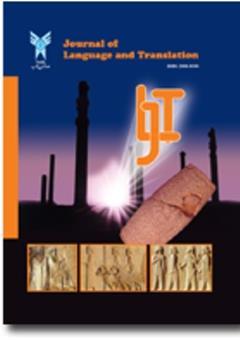Reciprocal-Scaffolding Effects on EFL Learners' Oral Skills and Their Self-Efficacy
Subject Areas : All areas of language and translation
Marzieh Sabzevari
1
,
Neda Fatehi Rad
2
*
![]() ,
Massoud Tajaddini
3
,
Massoud Tajaddini
3
1 - Department of English Language, Maybod Branch, Islamic Azad University, Maybod, Iran
2 - Department of English Language, Kerman Branch, Islamic Azad University, Kerman, Iran
3 - Department of English Language, Kerman Branch, Islamic Azad University, Kerman, Iran
Keywords: Scaffolding Strategies, Reciprocal Strategies, Listening Skill, Speaking Skill, On-Line Learning,
Abstract :
This experimental study investigated the impact of reciprocal-scaffolding teaching procedures on two aspects of learners' quality: their self-efficacy and speaking and listening skills. The study also analyzed the EFL learners’ attitudes on the use of reciprocal-scaffolding strategies via LMS. Moreover, it highlighted the possible difference between the effect of reciprocal-scaffolding strategies on EFL learners' oral skills and their self-efficacy. To this end, 48 pre-intermediate Iranian EFL learners were selected as the participants. A concurrent embedded mixed-methods design was employed to collect qualitative and quantitative data through the pre and posttest PET-test and an interview at the end of term. The results of independent samples t-tests and paired t-tests indicated that students who received treatment in form of integration of scaffolding and reciprocal strategies received both statically and practically significantly higher marks on speaking and listening skills, and self–efficacy than did the students in the control group. There was also a significant relationship between self-efficacy and success in speaking and listening performance. It can be inferred that reciprocal-scaffolding strategies have a significant positive impact on the improvement of oral skills. Finally, the results of the interview revealed the positive and negative attitudes of students towards the use of the strategies in LMS context.
Al-Sibai, D. (2004). Promoting oral fluency of second language learners: educational linguistics Department of English. King Saud University. Adult Learners of English.
Bandura, A. (1994). Social cognitive theory and exercise of control over HIV infection. In Preventing AIDS (pp. 25-59): Springer.
Burns, A., & Joyce, H. (1997). Focus on Speaking: ERIC.
Clarke, B. A. (2004). A shape is not defined by its shape: Developing young children's geometric understanding. Australian Research in Early Childhood Education, 11(2), 110-127.
Cole, M., Cole, S. R., & Lightfoot, C. (2005). The Development of Children: Macmillan.
Daniels, H. (2001). Vygotsky and Pedagogy. London: Routledge Falmer. In.
Duchesne, S., & McMaugh, A. (2018). Educational Psychology for Learning and Teaching: Cengage AU.
Greenfield, P. M. (1984). A theory of the teacher in the learning activities of everyday life. Everyday cognition: Its development in a social context.
Grunwald, T., & Corsbie-Massay, C. (2006). Guidelines for cognitively efficient multimedia learning tools: educational strategies, cognitive load, and interface design. Academic Medicine, 81(3), 213-223.
Hammond, J. (2001). Scaffolding: Teaching and learning in language and literacy education: ERIC.
Hashey, J. M., & Connors, D. J. (2003). Learn from our journey: Reciprocal teaching action research. The Reading Teacher, 57(3), 224-232.
Jacobs, G. M. (2001). Providing the scaffold: A model for early childhood/primary teacher preparation. Early Childhood Education Journal, 29(2), 125-130.
Jacobs, G. M., Lee, C., & Ng, M. (1997). Cooperative Learning in the Thinking Classroom: Research and Theoretical Perspectives. Online Submission.
Jafarigohar, M., & Mortazavi, M. (2016). Promoting metacognition in EFL classrooms through scaffolding motivation. Iranian Journal of Applied Linguistics (IJAL), 19(1), 73-98.
MacIntyre, P. D., & Gardner, R. C. (1991). Investigating language class anxiety using the focused essay technique. The Modern Language Journal, 75(3), 296-304.
Mansouri, S., &MashhadiHeidar, D. (2019). Peer/teacher technology-enhanced scaffolding through process approach and Iranian EFL learners’ vocabulary knowledge: A probe into self-regulation. Journal of Teaching Language Skills, 38(3), 189-223.
Mercer, N. (1994). Neo-Vygotskian theory and classroom education. Language, Literacy, and Learning in Educational Practice, 92-110
Miller, P. H. (2002). Theories of Developmental Psychology: Macmillan.
Palinscar, A. S., & Brown, A. L. (1984). Reciprocal teaching of comprehension-fostering and comprehension-monitoring activities. Cognition and Instruction, 1(2), 117-175.
Pressley, M. (2002). Metacognition and self-regulated comprehension. What research has to say about reading instruction, 3, 291-309.
Razaghi, M., Bagheri, M. S., & Yamini, M. (2019). The Impact of Cognitive Scaffolding on Iranian EFL Learners' Speaking Skill. International Journal of Instruction, 12(4), 95-112.
Rosenberger, C. (2003). Scaffolding Language, Scaffolding Learning: Teaching Second Language Learners in the Mainstream Classroom. Language Arts, 80(4), 310
Skehan, P. (1998). A cognitive approach to language learning: Oxford University Press.
Stone, C. A. (1998). The metaphor of scaffolding: Its utility for the field of learning disabilities. Journal of Learning Disabilities, 31(4), 344-364.
Stricklin, K. (2011). Hands‐on reciprocal teaching: A comprehension technique. The Reading Teacher, 64(8), 620-625.
Tani, M. (2005). Quiet, but only in class: Reviewing the in-class participation of Asian students. Paper presented at the Higher Education Research and Development Society of Australia Conference, Sydney, New South Wales. Retrieved September.
Todd, R. B., & Tracey, D. H. (2006). Reciprocal Teaching and Comprehension: A Single Subject Research Study. Online Submission.
Vygotsky, L. S. (1980). Mind in Society: The Development of Higher Psychological Processes: Harvard university press.
Wells, G. (1999). Dialogic inquiry: Towards a Socio-cultural Practice and Theory of Education: Cambridge University Press.
Zarandi, S. Z. A., & Rahbar, B. (2014). The impact of interactive scaffolding on Iranian EFL learners’ speaking ability. International Journal of Language Learning and Applied Linguistics World (IJLLALW), 6(2), 344-353.

